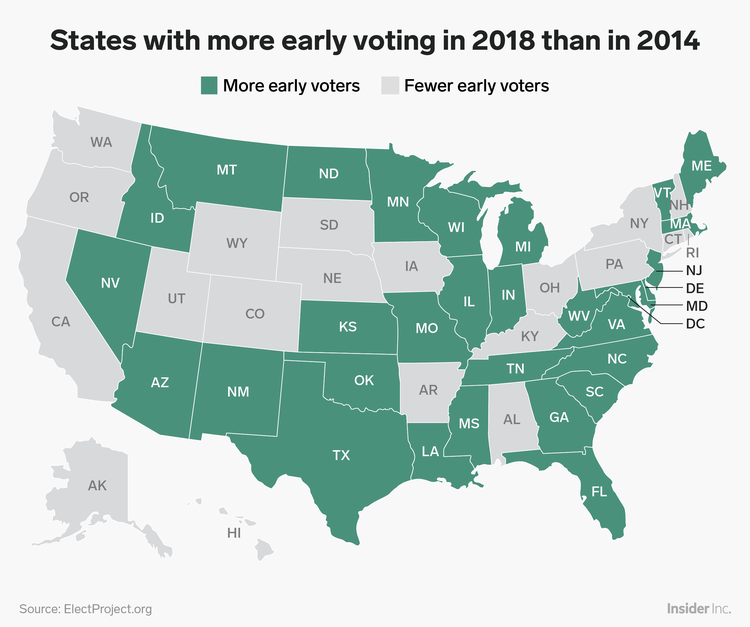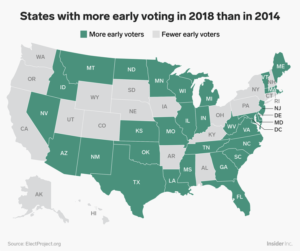

Multiple states saw a sharp increase in early voting, as well as higher turnouts overall.
11/08/2018
By Ollie Gratzinger | Opinions Editor
On a chilly fall morning, lines began to form outside of polling locations all around the U.S. Following a series of massive social media movements aimed at encouraging all who could — mainly America’s young people — to vote, Telegraph estimates that about 113 million people participated in the 2018 midterms on Nov. 6. Compared to approximately 83.3 million in the 2014 midterms, this year’s turnout was historic, with 49 percent of registered voters taking part. That might not seem like much, but it’s a high figure for a non-presidential election, and it was certainly enough to make a difference.
Here in Pennsylvania, Democratic incumbent Bob Casey took the Senate, beating out Republican Lou Barletta, Libertarian Dale Kerns and Green Party’s Neal Gale. Democrat Conor Lamb became the representative for the 17th Congressional District (Pittsburgh), and Democratic incumbent Tom Wolf won the governor’s race.
Democrats gained a clear majority in the House of Representatives, earning 223 seats as opposed to the 197 won by Republicans at time of print. The New York Times reports that 313 districts around the country swung to the left. Even though the blue wave was smaller than that of 2006 — the last time Democrats flipped the House — the average district shifted 10 points to the left, according to the NYT.
Republicans, though, had more luck than expected in the Senate, making up about 51 percent of the seats.
Some of the South’s most liberal democratic candidates took an unfortunate loss: Texas’ Beto O’Rourke in the Senate race, Florida’s Andrew Gillum in the governor’s race and potentially Stacey Abrams in the Georgia governor’s race. But self-described democratic socialist Alexandria Ocasio-Cortez won New York and, at only 29, became the youngest woman ever elected to Congress, according to USA Today.
Nationally, this week’s midterms were a resounding win for marginalized communities all around the country, many of whom may finally see themselves represented in federal office.
According to CNN, other historical record-setters include Sharice Davids of Kansas, a lesbian and Native American, who became the first LGBT+ Kansan and one of the first two Native American women elected to Congress, along with New Mexico’s Debra Haaland. Michigan Democrat Rashida Tlaib and Minnesota Democratic-Farmer-Labor Party’s Ilhan Omar became the first Muslim women in Congress. Omar, who came to America two decades ago as a refugee, is also the first Somali-American in Congress.
Texas sent its first few Hispanic women in Congress as well, with Veronica Escobar and State Sen. Sylvia Garcia projected to win districts near El Paso and Houston, respectively. Arizona will send Democratic Rep. Kyrstin Sinema to Congress as its first female senator, and South Dakota elected Republican Kristi Noem as its first female governor.
CNN also reports that Colorado Democratic Rep. Jared Polis’ bid for governor “will be successful,” making him the first openly gay man elected to Congress. Likewise, Republican Kim Davis, a Kentucky clerk who received national attention in 2015 after serving jail time for refusing to issue marriage licenses to homosexual couples, lost her bid for a second term. Though one of her adversaries was David Ermold, one of the men denied a marriage license in 2015, he failed to win the nomination, and Democrat Elwood Caudill Jr. took over Davis’ position instead.
A deeply polarized U.S. could contribute to the radical changes we’ve seen with this midterm election. NBC News is calling it a suburban revolt against Trump; Most of the districts that flipped entirely from Republican to Democrat were located in America’s eastern and mid-western suburbs. It’s possible — even probable — that citizens concerned about the rising tide of right-wing nationalism, white supremacy and the upward trend in anti-Semitic, homophobic and anti-immigrant sentiments were inspired to take to the polls to bring about the change they feel the nation needs.
Additionally, the students who survived the Parkland shooting earlier in the year came of age in time for this election, and celebrities popular among youth — Taylor Swift, for example — urged millions of social media users to do their civic duty.
Hopefully an engaged and empathetic citizenry is enough to combat the rise of the alt-right, and enough to preserve democracy in the wake of a rising authoritarian threat. Even though the blue wave wasn’t the left-leaning tsunami that some had hoped for, the election still helped to craft a more representative Congress. And that’s a good start.




